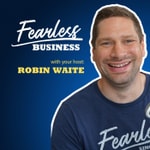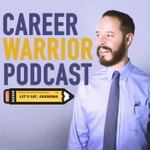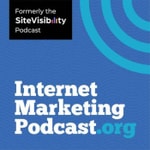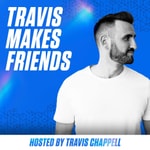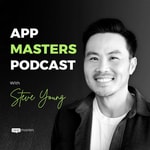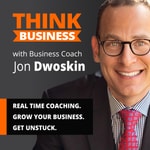21st Century Entrepreneurship – Détails, épisodes et analyse
Détails du podcast
Informations techniques et générales issues du flux RSS du podcast.

21st Century Entrepreneurship
Martin Piskoric
Fréquence : 1 épisode/7j. Total Éps: 438

The 21st Century Entrepreneurship Podcast is a 4 x Gold-Award weekly show that features interviews with cutting-edge leaders and successful entrepreneurs. We talk about the fundamentals of starting and growing a business, achieving and maintaining success, as well as the difficulties of entrepreneurship and its future. Subscribe to the 21st Century Entrepreneurship Podcast and never miss an episode, so you can stay on top of the curve and gain the knowledge you need to succeed in today's competitive landscape.
Classements récents
Dernières positions dans les classements Apple Podcasts et Spotify.
Apple Podcasts
🇺🇸 États-Unis - entrepreneurship
29/07/2025#66🇺🇸 États-Unis - entrepreneurship
28/07/2025#71🇺🇸 États-Unis - entrepreneurship
27/07/2025#89
Spotify
Aucun classement récent disponible
Liens partagés entre épisodes et podcasts
Liens présents dans les descriptions d'épisodes et autres podcasts les utilisant également.
See all- https://contentallies.com/
102 partages
- https://www.yourgreenpal.com/
59 partages
- https://www.leadcookie.com/
11 partages
- https://youtu.be/djKaLA6NSHo?t=229
2 partages
Qualité et score du flux RSS
Évaluation technique de la qualité et de la structure du flux RSS.
See allScore global : 62%
Historique des publications
Répartition mensuelle des publications d'épisodes au fil des années.
Daryl Black: How Do You Lead When Chaos Hits?
Saison 9 · Épisode 68
samedi 26 juillet 2025 • Durée 29:05
Daryl Black is a crisis-tested leadership coach, emergency response veteran, and creator of the Order to Chaos framework—and we spoke about what building startups, leading high-growth teams, and surviving natural disasters have in common.
With three decades of experience in both emergency management and corporate project leadership, Daryl brings frameworks forged in fire—literally. From tornadoes and wildfires to multimillion-dollar business projects, he’s learned that leading in uncertainty requires more than grit—it demands clarity, structure, and emotional mastery.
“What got you here won’t get you there… It’s no longer about doing the stuff anymore. It’s about the people part of the business.”
We unpacked his Order to Chaos model, including how to go from frantic startup hustle to focused leadership, and why so many founders stall when they can’t make the leap from expert to people leader.
“I’ve coached thousands of leaders and so many of them say: ‘I love my job. It’s the people part that’s hard.’ And I get it.”
You’ll also hear how he builds high-performing autonomous teams—sometimes from scratch in the middle of an evacuation zone—and what leaders of leaders must do to scale influence across organizational layers.
Topics we explored:
- How crisis leadership principles apply to business growth
- What entrepreneurs get wrong about scaling
- Why frameworks beat improvisation under pressure
- The 1-3-1 method for decision-making and ownership
- How to coach your top performers and manage your weakest links
- Moving from command-and-control to a support model
“We’re not building the bus as we’re driving it anymore. We’ve got the brights on now.”
Key Takeaways:
- Self-mastery comes first: “Leadership always started with me… am I managing my sleep well? My nervous system?”
- Productivity is non-negotiable: Learn about “time fencing” and how to stay focused in the eye of the storm.
- Influence without micromanaging: “Come to me with one problem, three options, and one recommendation.”
- From chaos to clarity: Frameworks like OTC and 1-3-1 aren’t just tools—they’re lifelines.
Whether you’re leading a startup, scaling a team, or managing through the unknown, Daryl’s stories and systems offer an essential blueprint for staying calm, focused, and effective—even when the metaphorical tornado hits.
Brian Truman: Can You Really Succeed Without Going It Alone?
Saison 9 · Épisode 67
vendredi 25 juillet 2025 • Durée 19:28
Brian Truman is an experienced entrepreneur based in Nashville, Tennessee, and we spoke about the hidden power of collaborative entrepreneurship, the mindset shift from corporate comfort to building your own business, and how to create a life — and legacy — by design.
From leaving a secure 22-year corporate career to launching multiple successful companies in real estate, business brokerage, and property management, Brian shares the moments that shaped his journey — and the mindset that sustained it. But perhaps most striking is his belief that entrepreneurship doesn’t have to be lonely.
“Too many people go into it thinking they have to do it all by themselves when they don’t — and it’s best that they don’t.”We discussed the role of mentorship, spousal alignment, and what it really takes to transition from a paycheck to passion. Brian’s story is filled with practical insight — like how a single cold call to a Florida-based broker turned into a life-changing 90-minute call and a lasting friendship.
“I asked him if I could have 10 or 15 minutes. We talked for an hour and a half.”He breaks down how his companies help clients build generational wealth by using business exits to fund real estate strategies, and why “a life by design” is more than a motivational phrase — it’s a step-by-step plan he creates with his clients over six to eight years.
And when it comes to leadership and legacy, Brian makes it clear:
“We’re here to help you create your standard of living so you can create your standard of giving.”Key themes we discussed:
- Why mentorship isn’t weakness — it’s your shortcut
- Navigating the leap from corporate life to entrepreneurship
- Balancing ambition with a partner’s sense of security
- Building long-term financial freedom through strategic business exits
- The underestimated ROI of community service in company culture
Takeaways:
- Ask boldly. The right conversation can change your career.
- Plan backward. Map your vision year by year — income, ownership, freedom.
- Don’t build alone. Collaboration is not a risk — it’s your edge.
- Legacy isn’t abstract. It’s built through systems, service, and structure.
If you’ve ever wondered whether you have to figure out entrepreneurship alone — or if your success can fuel more than just income — this episode will shift your perspective.
Mitch McGinley: How Can You Sell Your Business for Maximum Value?
Saison 9 · Épisode 58
mardi 8 juillet 2025 • Durée 28:05
Mitch McGinley is the founder and CEO of a Boutique Fitness Broker firm, an expert in guiding entrepreneurs in health, wellness, and fitness through the complex process of selling their businesses. We spoke about his journey from hotel management to owning and selling a yoga studio, the realities of business valuation, and the strategies that lead to successful exits. Our conversation unpacked why only 20% of listed businesses sell and how Mitch’s approach achieves an impressive 80-90% success rate.
The most critical insight from Mitch is the importance of preparation and mindset in achieving a lucrative exit. He emphasizes that valuations hinge on profit, not sentiment or brand aesthetics: “Valuations are based on profit... not your brand, not how cool your logo is, not how long you’ve been in business.” This reality check is vital for passionate entrepreneurs who may overlook financial discipline. Mitch’s story of helping a Club Pilates owner secure $600,000 more in just four days underscores the value of expert guidance: “I saw him get an offer and saw the deal through and he walked away with $600,000 more.”
We explored practical steps for business owners to prepare for a sale, from cleaning up financial records to planting seeds with potential buyers years in advance. Mitch’s advice to “begin with the end in mind,” inspired by Stephen Covey, encourages owners to view their business as a chapter, not a lifelong commitment: “No one expects you to keep the same job for the rest of your life. Why would you keep one business for the rest of your life?” His perspective is a wake-up call for those who see their ventures as inseparable from their identity, especially in altruistic fields like yoga or wellness.
Mitch also demystifies the brokerage process, describing it as a “white glove service” where brokers act as advisors, therapists, and advocates, aligning sellers and buyers for mutual success. His focus on community preservation—ensuring businesses remain sacred “third spaces” for employees and clients—adds a heartfelt dimension to the transactional world.
Key Takeaways:
- Profit Drives Value: Clean financials and a focus on discretionary earnings are non-negotiable for attracting serious buyers.
- Plan Early: Start preparing two years out by organizing records, networking with investors, and subtly identifying internal buyers: “Planting seeds... casual comments to staff, clients, friends... can grow within their brain.”
- Leverage Expertise: A skilled broker can significantly increase your payout, as seen in Mitch’s $600,000 win, debunking the myth that broker fees diminish returns.
- Mindset Shift: Treat your business as a valuable asset, not your life’s purpose, to embrace new chapters with confidence.
This episode is a must-listen for entrepreneurs who want to turn their passion-driven businesses into profitable exits while preserving their legacy. Mitch’s blend of hard-earned wisdom and practical tactics offers a roadmap to not just sell, but to sell smart.
Roger Igo: Can Vision and Grit Overcome Bankruptcy?
Saison 8 · Épisode 95
samedi 19 octobre 2024 • Durée 38:23
Roger Igo is an entrepreneur who has lived through it all—success, failure, and redemption. We spoke about his incredible journey from humble beginnings to becoming a leading figure in the events industry, orchestrating over $100 million worth of legendary events annually. But his story isn’t just about success; it’s about survival, vision, and overcoming deep personal and financial crises.
Roger shared his rise to the top, from being a kid who’d "do anything for a buck" to owning one of the most prestigious event venues in Houston. He recounts how he hit rock bottom: “I had the $100,000 car in the driveway, and I was looking for loose change in the couch cushions to put gas in it.” Through sheer determination, Roger found a way out of bankruptcy and despair, using his entrepreneurial instincts to broker deals, raise funds, and keep his dream alive.
One of the pivotal moments Roger highlights is how he applied the lessons from The Psychology of Influence by Robert Cialdini to not only survive as a bill collector but to thrive, becoming the top performer in his field. “I shot to the top of the board… people were fighting to sit next to me,” he recalls, showing how the power of influence can change the course of your business and life.
Roger’s transformation truly began when he harnessed the power of vision. He explains, "The closer you get to fruition, the more clarity you get. It’s like a snowball effect." This clarity helped him raise over $6 million to save his business—without giving up equity or taking on debt—by leveraging his relationships and applying the same grit that got him through the music and real estate industries. Roger’s key to success is simple but profound: "You can get clarity of vision, and once you do, every molecule in your body aligns with it."
Key takeaways from this episode include:
- Vision is everything: Once you can see success clearly in your mind, you can align your actions to make it a reality.
- Grit and persistence: No matter how many times you fall, as Roger says, "Keep on going"—a theme he’s lived through all 34 of his jobs.
- The power of influence: Learn how Roger used persuasion techniques from his bill-collecting days to raise millions and build a thriving business without giving up control.
Roger’s story is a testament to how far vision, grit, and strategic thinking can take you—even from the brink of bankruptcy. This episode is packed with wisdom on not just surviving in business but thriving, no matter how tough the climb may be.
Jonathan Hunt Glassman: Can a Daily Pill Help You Drink Less?
Saison 8 · Épisode 94
jeudi 17 octobre 2024 • Durée 09:50
Jonathan Hunt Glassman is a healthcare expert and CEO of Oar Health, who struggled with alcohol use for much of his adult life. We spoke about his personal journey from battling alcohol dependence to founding a company that provides a daily pill to help others drink less or quit. Jonathan shared how prescription medication transformed his life, saying, "It helped me take back control over alcohol rather than feeling like alcohol had control over me."
Throughout the episode, we discussed how medication can be a powerful tool alongside other methods like therapy and peer support for those looking to manage alcohol use. Jonathan highlights the importance of finding a treatment that fits the individual, stressing, "You are an expert on yourself, and your intuitions on what's going to help you achieve your goals…are an extremely valid source of guidance."
Key takeaways from the conversation include:
- Understanding that there are multiple pathways to reducing alcohol consumption, and that medication is an underutilized option.
- The importance of addressing underlying issues like social anxiety, as Jonathan notes, "A little bit of vulnerability is often the route to connection."
- The impact of drinking less on one’s overall well-being—whether it's gaining focus at work, improving relationships, or even experiencing unexpected benefits like "clearer skin."
This episode offers a relatable, actionable perspective on how taking the first step toward drinking less doesn’t have to be overwhelming. Whether you're struggling with alcohol use or curious about solutions, Jonathan’s story and insights provide inspiration and practical advice for making meaningful change.
Anthony Nitsos: How Can CFOs Diagnose & Cure Your Cash Flow Woes?
Saison 8 · Épisode 93
jeudi 17 octobre 2024 • Durée 32:09
Anthony Nitsos is a former medical student who transitioned into manufacturing and eventually finance, and we spoke about how this unique path shapes his approach to solving financial problems for businesses. "I’m not a CFO as much as I am a doctor of money," he explains, using his medical training to diagnose financial health in companies just as a physician would for a patient. Anthony’s perspective is that CFOs need to do more than treat symptoms—they must get to the root cause of issues that plague businesses, particularly when it comes to cash flow and operational efficiency.
Anthony draws striking parallels between the human body and financial systems. "A factory is no different than a human body. Where you have blood flow, we have cash flow. Where you have a nervous system, we have an IT system." His background in both medicine and manufacturing enables him to see the interconnectedness of operations and finance in a way that many traditional CFOs overlook. By focusing on optimizing the "central nervous system" of a business—its accounting and financial reporting system—Anthony helps companies not just survive but thrive.
We also discussed the critical role of cash flow management. Anthony reveals that most of his time with clients is spent discussing cash, not profits: "I easily spend 80% to 90% of my time with clients talking about cash." He explains that focusing on cash flow forecasting is vital for ensuring a business can meet its operational needs and plan for the future. For entrepreneurs and business leaders, understanding how to manage cash effectively is key to sustainable growth.
Finally, Anthony emphasizes the importance of building long-term value. Whether preparing a company for an exit or ensuring ongoing profitability, he underscores the role of a CFO in helping businesses maximize their worth. "What is the purpose of a corporation? To build shareholder wealth, period." From metrics like Annual Recurring Revenue (ARR) to gross margins, Anthony breaks down how businesses can align their strategies to boost valuation and secure future success.
A few takeaways from the discussion include:
- Fixing root causes in your financial systems leads to long-lasting improvements, not just temporary relief.
- Cash flow management is more important than focusing solely on profit, as it directly impacts a business's ability to operate and grow.
- A well-structured accounting system is the "spinal cord" of a business, providing the essential data needed for informed decision-making and value creation.
Anthony’s approach is all about precision, whether he’s diagnosing financial symptoms or helping a company prepare for its next stage of growth. If you’re an entrepreneur struggling with cash flow, financial reporting, or planning an exit, this episode will provide actionable insights to optimize your business. As Anthony puts it, "Once you fix that root cause, it goes away forever."
Cameron Bawden: How to Scale and Exit a Successful Service Business?
Saison 8 · Épisode 92
mercredi 16 octobre 2024 • Durée 23:15
Cameron Bawden is a seasoned entrepreneur who built the largest pest control company in Arizona, scaling it from a single truck to over 100 vehicles in less than 14 years. We spoke about his journey of creating and scaling multiple service-based businesses, the systems and processes that fueled his success, and his recent $60 million exit that transformed the trajectory of his career.
One of the key highlights of Cameron’s approach is the importance of staying consistent and showing up every day: “That's the thing that I preach now—stay consistent. You got to show up every single day and do those little things that matter.” He emphasized how crucial it is for business owners to wear multiple hats in the beginning but to eventually delegate and build a strong leadership team. Cameron shared insights on the 'rule of seven,' explaining that no manager should have more than seven direct reports to ensure employees feel valued and appreciated.
We also dove into his experience with mergers and acquisitions, where he revealed the steps entrepreneurs can take to maximize their company’s value: “I saw how important it was—how they wanted the books, the leadership team, the organization, the systems, the processes.” His transparency with employees about company goals, such as EBITDA margins, has been a game-changer in aligning his team with the company’s vision: "When I was fully transparent... I got so many ideas from people on the front line."
Finally, Cameron discussed his personal philosophy on balance—financially, professionally, and personally. For him, giving back to the community through service work, like his annual food drive and helicopter ride giveaways, is a cornerstone of his balanced life.
Key Takeaways:
- Systems and Processes: How establishing scalable systems and empowering the right people can help you scale faster and exit profitably.
- Consistent Growth: The importance of consistent effort and culture in overcoming the challenges of entrepreneurship.
- Leadership and Delegation: Why building the right leadership team using the 'rule of seven' is key to business success.
- Customer Referrals: “We've generated over 25,000 customer referrals.” Learn why customer referrals are invaluable and how to drive them.
- Community Impact: How giving back through community service and personal involvement creates lasting fulfillment and reinforces company culture.
This episode offers real-world insights into scaling service businesses and achieving massive exits while maintaining a balanced and fulfilling life.
Steven Montgomery: Can Blue-Collar Work Fuel Your Wealth?
Saison 8 · Épisode 91
mardi 15 octobre 2024 • Durée 25:13
Steven Montgomery is the Founder and CEO of ResiBrands, and we spoke about how he went from being a college dropout to leading one of the fastest-growing home service franchises in the nation. Together with Codie Sanchez, Steven is on a mission to build the greatest trades franchises in the U.S., all while bringing dignity back to blue-collar work.
Throughout the conversation, Steven emphasized the shift in perspective around home service trades. As millennials reconsider the appeal of desk jobs, opportunities in blue-collar businesses, such as franchising, are gaining traction. He explains, “Being stuck behind the screen isn't as fulfilling as they thought it would be...there are amazing franchise opportunities like ours, and people are really starting to pay attention.”
Steven shares how franchising offers a pathway to wealth and freedom for individuals, regardless of their experience in trades. “You don't have to know anything about paint...when you get into a franchise system, you get taught how to hire people who already know the work, and you're building a scalable business,” Steven explains, highlighting the potential for growth and steady cash flow in this field.
One of the most significant insights Steven offers is the importance of thoughtfulness in home services. By going above and beyond for clients, businesses can create lasting impressions and drive powerful referral marketing. As Steven notes, “The secret to referral marketing is to give them a story to tell.” He shares how simple gestures, like offering extra services during a job, can turn satisfied customers into enthusiastic promoters.
Inspired by the book The E Myth, Steven found that franchising not only allowed him to scale his business but also empowered others to become business owners. "Instead of building something just for yourself, you can empower other people to build legacy and wealth for themselves using your system," he says, pointing to the collaborative nature of franchising.
Lastly, Steven emphasizes the critical role mindset plays in long-term success. He advises being mindful of the words we speak, as they can shape our reality: "If you start saying, 'Hey, this business is going to fail,' guess what? It's going to fail...but if you say, 'I'm going to get past it,' you will." His focus on grit and positive thinking offers valuable lessons for entrepreneurs facing challenging times.
Takeaways:
- Franchising in blue-collar industries is a growing opportunity for those seeking financial independence and steady cash flow.
- Providing thoughtful, unexpected services can dramatically increase client satisfaction and drive referrals.
- Your mindset and the way you speak about your goals play a critical role in your long-term success.
This episode offers practical insights for aspiring entrepreneurs looking to build something meaningful in an often overlooked industry.
Mike Malloy: Is a Fractional Executive What You Need to Scale?
Saison 8 · Épisode 90
vendredi 11 octobre 2024 • Durée 25:30
Mike Malloy is a seasoned entrepreneur, former Deloitte consultant, and the CEO of Malloy Industries, a company that helps business leaders regain control of their time and scale their businesses through fractional executive services. In this episode, we spoke about how entrepreneurs can effectively delegate tasks, break free from the day-to-day grind, and focus on the bigger picture. Mike candidly shares how a personal tragedy shifted his perspective, teaching him the importance of building systems that don’t rely solely on one person’s energy.
Mike introduces the concept of fractional executives, part-time experts who bring decades of experience to growth-stage companies without the overhead of full-time salaries. "The future of work is fractional," Mike explains, emphasizing the flexibility and expertise that these professionals offer. Whether it's scaling a B2B sales operation from $1 million to $10 million or navigating a sudden crisis, fractional executives are the agile, cost-effective solution many companies need.
One key insight from this conversation is the idea of solving business problems with "who, not how." Instead of asking, "How do I solve this?" entrepreneurs should be asking, "Who can solve this for me?" Mike walks us through how Malloy Industries quickly connects businesses with vetted fractional leaders who can step in and immediately provide results. "You've got a hair-on-fire problem," Mike says, "it's not going to wait six months." Fractional executives are the answer to those urgent, high-stakes challenges.
Here are a few takeaways from our conversation with Mike:
- Delegate with confidence: Fractional executives can take ownership of entire business functions while you focus on growth.
- Buy back your time: You don’t need to be in the weeds every day. Let experts handle the areas that aren’t in your zone of genius.
- Tailored to your needs: With the Malloy Match process, you'll find a fractional executive who not only solves problems but fits seamlessly into your company's culture.
Mike's deep commitment to helping entrepreneurs balance business growth with personal fulfillment shines through as he shares, "I've built this whole business around my love of education, supporting entrepreneurs, and helping them build impact into the DNA of their companies."
Learn more about how fractional executives can help you scale, delegate, and reclaim your freedom in this insightful conversation with Mike Malloy.
Michael Breus: How Does Better Sleep Lead to True Wellness?
Saison 8 · Épisode 89
mercredi 9 octobre 2024 • Durée 18:22
Dr. Michael Breus is a clinical psychologist and renowned sleep specialist, best known as 'The Sleep Doctor.' We spoke about the overwhelming complexity of wellness today and explored how to simplify it by focusing on three core pillars: breathing, hydration, and sleep.
Michael shares his insights on how the wellness industry often confuses people with countless new trends, stating, "I've got to be honest with you, it's confusing as hell. I don't know if I'm supposed to have a green drink, a sauna, or hydrate." Instead of chasing after every new fad, Michael emphasizes the importance of getting back to basics, starting with something as fundamental as proper breathing, "Many people are shallow breathers... I can teach you how to do that without necessarily having medications." He also explains how hydration and consistent sleep form the foundation of well-being.
One of the most intriguing takeaways is Michael’s concept of ‘chronotypes,’ the genetic patterns that dictate whether you’re an early bird, night owl, or something in between. As Michael puts it, “It’s the ultimate cheat code for life... Once you know your chronotype, everything gets better and easier.” He further reveals how aligning your sleep schedule with your chronotype can lead to better performance and even allow you to sleep less while maintaining high energy.
Another key insight is his 'napa latte' technique, which boosts productivity with a perfectly timed combination of coffee and a 20-minute nap. It's not just about wellness for Michael; he also draws parallels between sleep and entrepreneurship, likening consistent sleep habits to “compounding interest,” providing long-term benefits even in high-pressure situations.
Key Takeaways:
- Master the basics: Breathing, hydration, and sleep form the essential foundation of wellness.
- Chronotypes matter: Understanding your genetic sleep pattern can help you optimize your day.
- Practical tools: Techniques like breath work and the 'napa latte' offer quick ways to improve focus and energy without complex routines.
- Sleep as an investment: Consistency in sleep builds long-term resilience, much like compounding interest in financial terms.
Michael’s practical and engaging approach offers listeners valuable takeaways to simplify their wellness routines without spending money on gimmicks. He distills the chaos of wellness into actionable steps, proving that sometimes, less is more.

